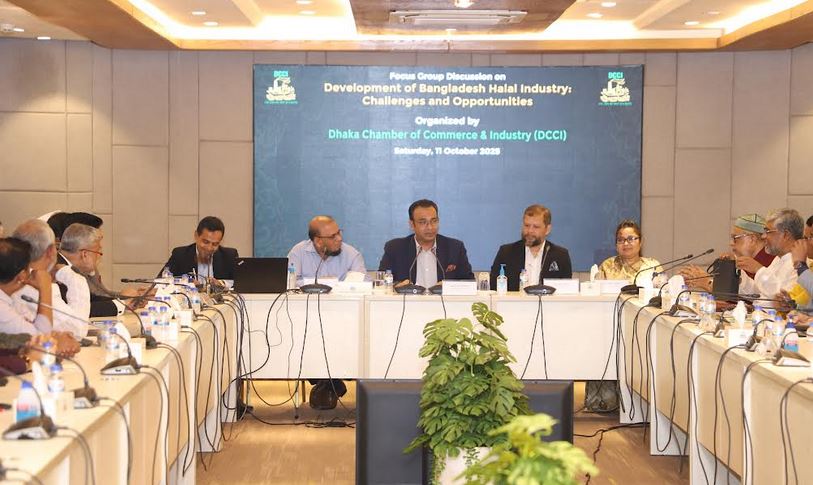News Flash

DHAKA, Oct 11, 2025 (BSS) - Experts have called for addressing the challenges and utilizing the existing opportunities to take Bangladesh’s halal industry into a new height in the global market.
They said that it is now high time to build a unified, knowledge-based, and scientifically supported halal ecosystem in Bangladesh in order to harness the full potentials of the halal market.
They also observed that it is not enough for a product to be merely permissible or legal under religious norms, it must also be pure, safe, and hygienic. The halal certification initiatives of the Islamic Foundation and the Bangladesh Standards and Testing Institution (BSTI) have brought significant progress in developing the country’s halal industry.
The speakers made these remarks at a focus group discussion titled “Development of Halal Industry in Bangladesh: Challenges and Opportunities” organized by the Dhaka Chamber of Commerce and Industry (DCCI) held at its office in the capital today.
In his welcome address, DCCI Senior Vice President Razeev H Chowdhury said that the halal industry is no longer just a religious concept; it has now become one of the fastest-growing and most promising sectors of the global economy.
He noted that the global halal market is worth around $3 trillion, while Bangladesh exports only about $850 million worth of halal products, most of which are agricultural. Due to the absence of an effective halal ecosystem and internationally recognized certification boards, this highly potential sector has not been able to achieve its desired growth.
Razeev H. Chowdhury further stated that the global halal market is projected to reach $9.45 trillion by 2034, yet Bangladesh is lagging behind because of structural and institutional weaknesses. “Lack of compliance with international standards, complexities in obtaining certificates, shortage of modern laboratories, and scarcity of skilled manpower are all hindering the development of a full-fledged halal ecosystem,” he added.
He emphasized that in order to turn the halal industry into a new driving force of the economy, it is now imperative to establish an independent halal certification board.
Presenting the keynote paper, Dr. Mominul Islam, Assistant Professor at the Department of Marketing, IUBAT, said that the national-level stakeholder dialogue held in Dhaka on August 2 and subsequently the joint programs in Malaysia from August 12–15 have paved the way for realizing the dream of establishing a Halal Industrial Hub in Bangladesh.
He mentioned that more than 300 institutions in the country have already received halal certification, adding that it is now high time to form a unified national halal authority to ensure coordination among the Islamic Foundation, BSTI, academic institutions, and the industrial sector.
Incorporating halal education into the curricula of schools, colleges, and universities is also essential, he added.
Dr. Islam pointed out that countries like Malaysia, Indonesia, and Singapore have integrated religious guidelines, scientific research, and national branding into policymaking to advance their halal sectors. “As a Muslim-majority nation, Bangladesh can also unlock the vast potentials through following a similar path,” he added.
He observed that Bangladesh is yet to develop a “Halal Country Branding.” To this end, the speakers suggested organizing large-scale international halal expos and implementing public-private partnership (PPP) projects.
Concluding the discussion, participants expressed optimism that through joint efforts, ethical commitment, and the use of modern technology, Bangladesh will one day secure a strong position in the global halal market by bringing not only economic prosperity but also spiritual satisfaction.
The discussants included Md. Aminul Islam, Director General of the Bangladesh Accreditation Board; Md. Zahirul Islam, Chief Executive Officer of Dhaka South City Corporation; Md. Ariful Haque, Director General (Joint Secretary) of BIDA; Baby Rani Karmakar, Director General of EPB; S.M. Abu Sayeed, Deputy Director (Halal Certification) of BSTI; and Dr. Md. Abu Saleh Patowary, Deputy Director of the Islamic Foundation.
DCCI Vice President Md. Salim Solaiman, members of the Board of Directors, and representatives from both public and private sectors were also present.